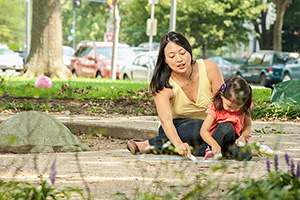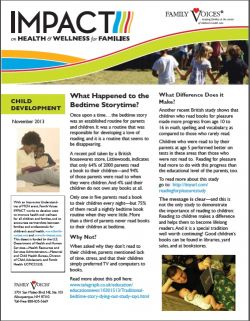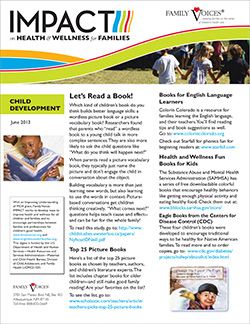
CHILD DEVELOPMENT
SECTIONS: Background ~ Child and Family ~ Ages and Stages ~ What You Can Do
 Newborns change quickly from babies to toddlers to teens. As parents, we provide love and support. And, just as our children change, our role as parents changes too. We must learn when to help, when to set limits, and when to stand back. Try to respect your children’s choices and support the steps they take toward adulthood.
Newborns change quickly from babies to toddlers to teens. As parents, we provide love and support. And, just as our children change, our role as parents changes too. We must learn when to help, when to set limits, and when to stand back. Try to respect your children’s choices and support the steps they take toward adulthood.
Children grow and develop in many ways, and changes may happen at different times. For example, a child’s body may mature more quickly than his feelings. There are general timelines for each stage (developmental milestones), but every child is different and develops at his own rate.
- Physical Development - how your children’s bodies grow, and what they can physically do (gross motor skills). Infants learn to clap, sit, and stand. Toddlers learn to walk, eat, dress, and use the toilet. Five to ten year olds learn to run, jump, and climb. Teens go through puberty.
- Intellectual Development - brain growth. Children learn to talk, read, and use what they learn to solve problems.
- Emotional Development - how children learn to feel love, joy and trust. It is also how a child learns to express and manage emotions, and to be aware of other people’s feelings.
- Social Development - how children become aware of others. They start as “me-centered,” and add parents, family, friends, teachers, and others to the list of people in their ever-widening social circle.
These four areas help form our children’s personalities as they develop their own interests, opinions, senses of humor, and become unique individuals.
Child and Family
As children grow, the family delights in each new skill their child learns. Parents also grow more confident about their parenting skills. Sometimes children have problems or delays in one or more areas of development. You come to know your child best - trust your instincts. If you have questions, talk to your child’s health care provider or teacher. They can help you figure out if your child just needs more time, or if your child needs referrals to programs or services. Children with special needs may take longer or need more help in reaching developmental milestones. Parents may also need support to learn about and address their child’s needs.
Ages and Stages
- Infants: Early development is all about growing, learning to trust caregivers, and feeling loved and safe. Newborns can do a lot. It is even more amazing how quickly babies learn to do even more. They smile, sit, crawl, stand, and babble.
- Early Childhood: One to four year olds grow and develop quickly. However, they do not always develop at the same rate in each area. A child might speak well, but have a hard time separating from parents. Or, the child may separate well, but not speak clearly enough for to understand. Children’s moods and different ways of thinking influence how they relate to others. A quiet child and an outgoing child will have different ways of playing with others, but both may enjoy books or sports.
- Middle Childhood: Five to 10 year olds begin to have their own ideas about what’s important and usually are ready to take on new roles. They have friends, and teammates. At school, they have classmates and teachers, and become part of a larger school community. They want to make their own decisions and try new activities outside the family.
- Adolescence: Eleven to 21 year olds change in so many ways. Their bodies may mature faster than their emotions. Parents may worry about peer pressure and risky behaviors. This is also an exciting time. Teens become more responsible. They may be making plans for work or continuing education past high school. Just because teens are getting older doesn’t mean they don’t need their parents. Talk with your teen. Ask about school, friends, hobbies and other interests. Your healthcare provider should also talk to your teen about healthy behaviors and safety.
- Children with Special Health Care Needs: Your child’s special needs may affect her development. Find ways to celebrate your child’s successes and accomplishments. Learn to ask for the help your child needs. Talk with other families to learn about supports to help you and your other children meet challenges.
What Can Families Do to Promote Healthy Child Development?
Be there for your children. Love them. Ask them about their experiences and points of view. Encourage them as they grow and learn new skills. Provide experiences that help your children develop new interests. You may worry about how you are doing as parents. Talk with other parents, family members, friends, and your child’s doctor. They can help by providing suggestions; you can decide what’s right for your family situation, values, and culture.
Other Ways to Encourage Healthy Development:
- See your children as individuals. Realize they all develop differently.
- Ask your children’s health care providers about what to expect at different ages and stages.
- Discuss any concerns about growth and development with your health provider, teachers, and others.
- Encourage your child to build a relationship with his health care provider. This will help your child learn to be responsible for his own health, as he becomes an adult.
ADDITIONAL RESOURCES:
Download Project IMPACT
1-page updates:
6 updates found



